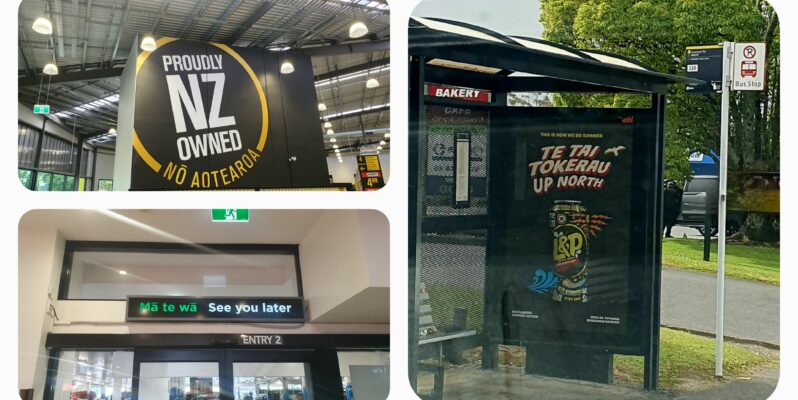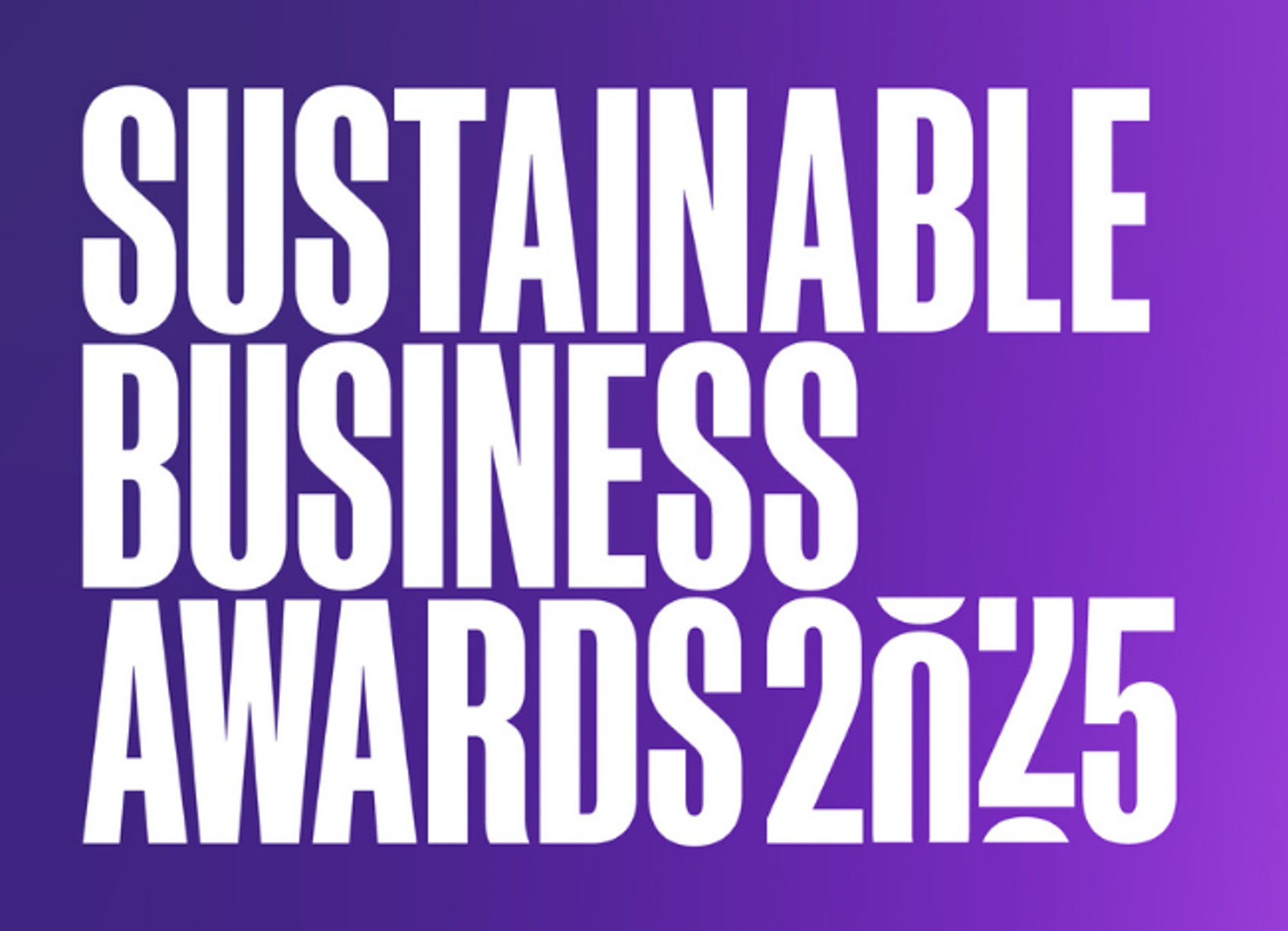In the last weeks of 2023, we noticed these three promotional messages around our home-base of West Auckland.
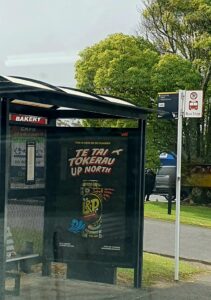
Coca Cola Oceania bus stop adshel poster for L&P reading ‘This is how we do summer. Te Tai Tokerau. Up North’ and featuring the 2023 Raumati campaign can design by Ira.
The messages, from a global drinks company, an Australian-owned shopping mall and a locally owned supermarket chain all share one thing in common; prominent use of te reo Māori, the indigenous language of Aotearoa New Zealand.
Why would Coca Cola Oceania use the Māori language name for the North of New Zealand in a bus shelter adshel promoting their L&P brand? Why would Westfield say ‘see you later’ first in te reo Māori in the signage over the exit to the Henderson shopping mall? Why would Pak’n’save integrate ‘Nō Aotearoa’ – literally ‘Of, or belonging to, the land of the long white cloud’ into its NZ-owned wall graphic in 2m tall lettering?
West Auckland has a strong Māori population and a growing number of te reo Māori speakers among both tangata whenua and tau iwi citizens. We are also a relatively youthful and politically progressive area within the wider city of Tāmaki Makaurau. Marketing managers working for these brands all know the future population of all Aotearoa is more like West Auckland, including more – and more – Māori.
The brands know Māori language week is growing in popularity each year. They understand more kiwis of every origin want to connect with what makes us unique in the world and to use the names our places and our creatures, our weather and our trees were given by the first people who saw them and named them. And it’s not just locals, here in West Auckland and more widely across our motū (islands), knowing and using more te reo. It’s also a key part of the way visitors to Aotearoa want to experience indigenous culture here.
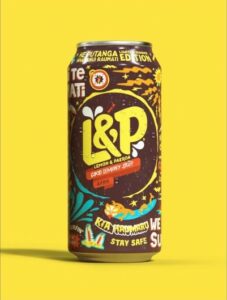 By using te reo in their promotions, the brands are saying ‘we too are part of the fabric of Aotearoa’. They are both asserting their own status as ‘local’ and affirming the mana of everyone who has Māori whakapapa or shares in the excitement of being part of a uniquely Pacific nation. They are part of a global trend to embrace the authentic and the specific, to assert roots and celebrate difference. It reflects a confidence that it’s not only ok to be a bit different from everyone else, but that difference has power.
By using te reo in their promotions, the brands are saying ‘we too are part of the fabric of Aotearoa’. They are both asserting their own status as ‘local’ and affirming the mana of everyone who has Māori whakapapa or shares in the excitement of being part of a uniquely Pacific nation. They are part of a global trend to embrace the authentic and the specific, to assert roots and celebrate difference. It reflects a confidence that it’s not only ok to be a bit different from everyone else, but that difference has power.
Diverse cultures, language and life experience bring a delicious range of experiences to any situation. Navigating them takes time, and grace and a degree of courage. To make progress demands humility – being willing to live with the discomfort of not understand everything all of the time – and a desire to learn from others.
What does this all mean for our ethical marketing practice at GoodSense?
We believe all leaders need to help their organisations establish their own relationship to our unique history in Aotearoa, if they are to find their place in our shared future. Kia whakatōmuri te haere whakamua. (I walk backwards into the future with my eyes fixed on my past.)
In case it’s helpful, here’s how we’re navigating this at GoodSense.
1 We’re trying to learn how to be good allies to Māori in how we work
We began by taking training in Te Tiriti o Waitangi as a whole team, in 2021, to give us a common baseline of understanding. And we support new team members to take the same training. We seek out ways to learn about customs and to draw on matauranga (traditional Māori knowledge) respectfully where we can. Some of us can speak some te reo, with widely ranging capability, and many of us are trying to learn more. Some of our team whakapapa Māori and we try hard to not burden them with responsibility for growing our collective cultural competence. We speak up when we see racism and colonising mindsets at work.
2 We always work with our clients to develop marketing and communications strategies and plans
This applies across all our work, with every type of client, because co-creation gets the best outputs that create the most impact. However, our facilitated, co-design approaches are particularly important when we are working outside of our own cultural experiences. Our co-creation processes mean we bring our knowledge to the table alongside structured questions so all our client participants can contribute what they know, think, feel and hope for.
We’re grateful to the Māori organisation clients we’ve worked with, including Maurea, Tahito, Te Pū Oranga Whenua, Papawhakaritorito Trust, Au Consulting and Agrisea for your patience when we stumble and your trust in our approach.
3 Values can transcend cultures
As a values-based organisation, we anchor all our work in what is best for people and the rest of nature. We reject the ‘profit at all costs’ approach of neo-liberal global capitalism. We use our powers to help clients to reshape society so all humans can thrive as part of a healthier, zero-carbon world. And we work alongside fellow Certified B Corporations to advance this approach to business. Working with others, collaboratively, to establish and achieve shared goals, is key to how we operate.
Our Māori clients tell us this ethos gives us, as a pākeha owned organisation, alignment with core Māori concepts, such as kaitiakitanga, kotahitanga and whanaungatanga.
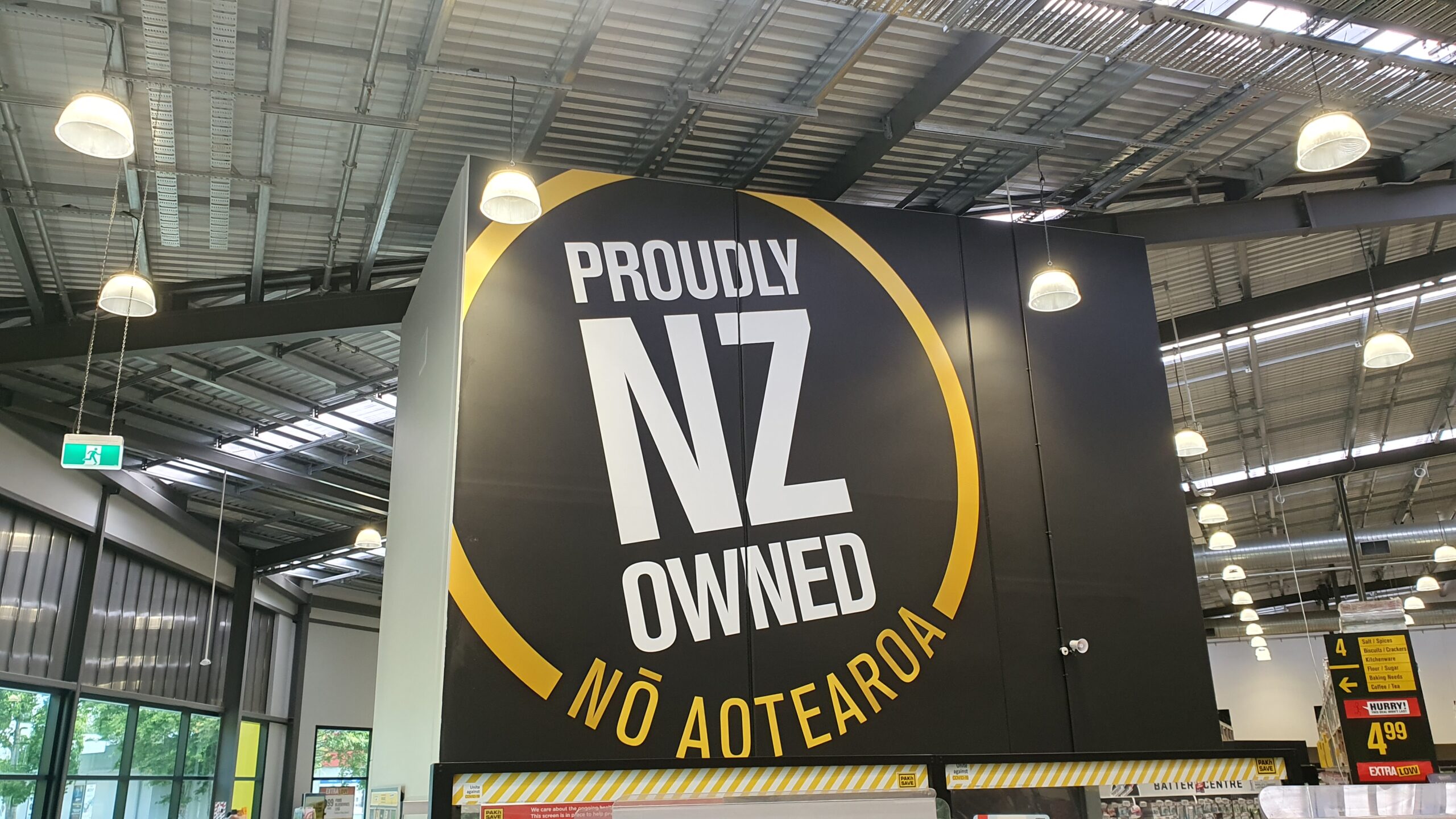
Pak’n’Save Henderson store sign reading ‘Proudly NZ Owned. Nō Aotearoa.’
So, should you put te reo phrases in your advertising?
Here’s what we say when clients who don’t whakapapa Māori ask us about using te reo, based on our learnings from those wiser than us.
Te reo Māori is a taonga, a treasure. While it can be tempting to use Māori words in names or slogans or advertising to signify belonging or solidarity, or appeal to Māori customers or clients, this is cultural appropriation unless it is based on strong foundations.
Those foundations are best laid by building cultural competence and connections. Pay for advice and be useful, not a burden. Know your local marae, hapū and iwi. Work to ensure your team members who whakapapa Māori feel they can be strong and safe in their culture at work, supported by colleagues and leaders alike. Celebrate Te Wiki o Te Reo Māori in your internal communications this September, and share your progress externally. Amplify Māori voices. Understand our history in Aotearoa to help your organisation find its place in our shared future – and the best words to define the part you play.
Start small.
We don’t know what work Pak’n’Save or Westfield did to develop the signage we feature in this blog. We’re optimistic they have built good foundations. The L&P team at Coca Cola Oceania worked with Ira and their Raumati campaign follows seven years of collaboration and learning.
Here’s some of the organisations who can help your workplace build more cultural competency:
If you’d like to talk over any of the topics raised in this article or to draw on us for values-based marketing and communications support, please get in touch.
Mā te wā.
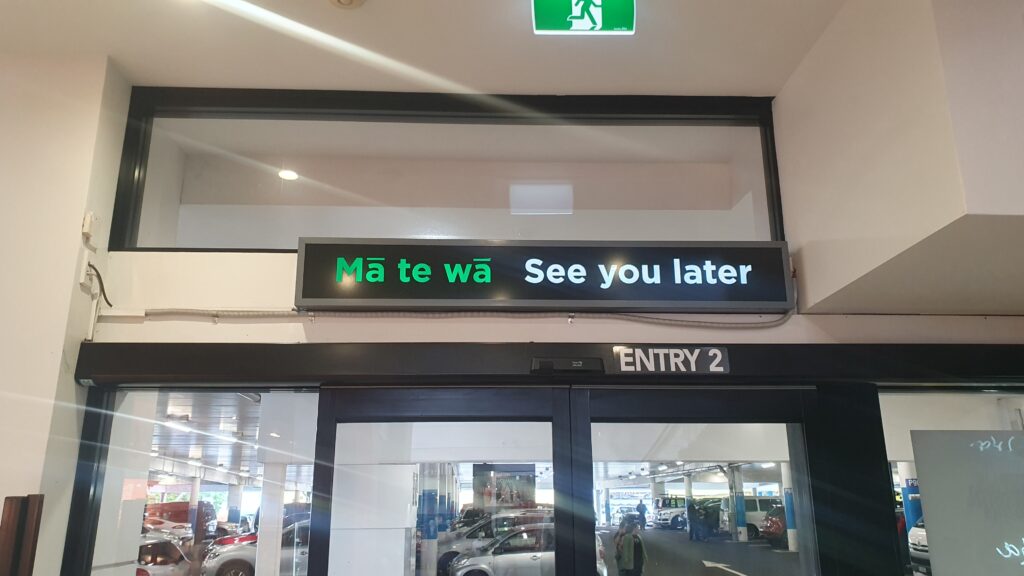
Westfield, Henderson bi-lingual exit sign reading ‘Mā te wā See you later’ ’
